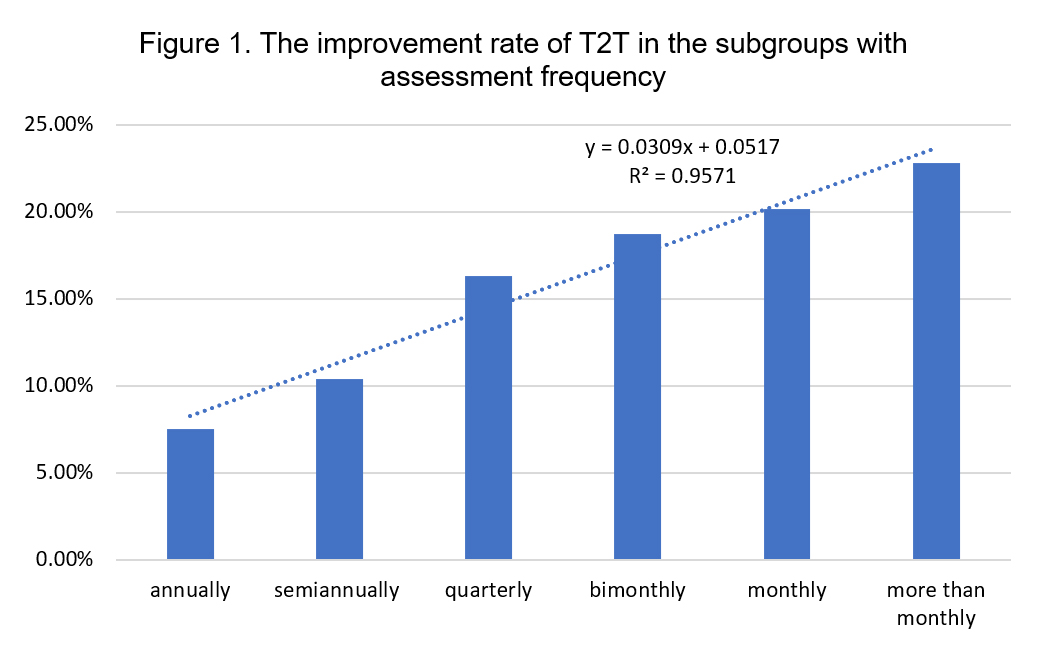Session Information
Date: Monday, November 9, 2020
Title: RA – Diagnosis, Manifestations, & Outcomes Poster IV: Lifespan of a Disease
Session Type: Poster Session D
Session Time: 9:00AM-11:00AM
Background/Purpose: Treat-to-Target (T2T) strategy are critical for the treatment of RA, but Chinese rheumatologists can hardly provide patients with a complete assessment in the clinic due to limited time. According to DAS28 scores, disease activity of the cohort was divided into four groups: remission (Rem), low (LDA), moderate (MDA) and high (HDA) disease activity. T2T, achieving a DAS28 score lower than 2.6 (Rem) or below 3.2 (LDA), is the main management strategy recommended by ACR and EULAR. To evaluate the patterns of T2T and related influential factors among RA patients after applying SSDM with repeated self-assessment in the real world.
Methods: SSDM is a mobile application for disease management. Patients were trained to do DAS28 assessment with SSDM and required for repeating self-assessment after leaving the hospital. After entry by patients, data can be synchronized to the SSDM terminal of authorized rheumatologists. Based on the patients’ data, rheumatologists will provide medical advices to them.
Results: From Jan 2015 to Jan 2020, 68,103 RA patients enrolled in SSDM. The mean age of 51.58±12.86 years old and median disease duration is 3.83 years. 52,355 patients performed self-assessment of DAS28, HAQ and morning stiffness duration totally for 114,792 times. Proportion of patients in Rem, LDA, MDA and HDA was 26%, 17%, 44% and 13% respectively at baseline. Among them, 5,488 RA patients from 219 hospitals across China were followed up for more than 12 months through SSDM.
The rate of T2T achievers were 50.20% (2,755/5,488) at baseline, and improved significantly to 65.14% (3,575/5,488) after 12 months follow up, p< 0.05. Among T2T achievers at baseline, 77.20% (2,127/2,755) maintained T2T, 22.80% (628/2,755) relapsed. Of patients who didn’t achieve T2T at baseline, only 56.75% (1,551/2,733) achieved T2T after 12 months follow up.
The frequency of self-assessment for DAS28 on T2T has been analyzed. Results indicated that the more frequent of the self-assessments being performed by patients, the higher improvement of T2T rate will be. The improvement rates of T2T in the subgroups which self-assessed with SSDM by annually, semiannually, quarterly, bimonthly, monthly and more frequent than monthly were 7.49%, 10.40%, 16.29%, 18.73%, 20.13% and 22.77% respectively. The improvement rate (y) of T2T was positively correlated with the frequency of self-assessment for DAS28(x) independently. The regression equation as “y = 0.0309x + 0.0517”, r = 0.9785, p< 0.01 (Figure 1).
Conclusion: Significant improvement was observed under applying SSDM through empowering RA patients. After proactive disease management via SSDM for more than 12 months, patients with DAS28< =3.2 score at baseline had a significantly higher retention rate of Rem disease activity. The patients who performed more frequent self-assessments had lower probability of relapse and higher rate of T2T. SSDM is a valuable tool for long term follow-up through empowering patients.
To cite this abstract in AMA style:
Yang J, Mu R, Li C, Wu B, Wang H, Fan W, Zou J, Zhang Y, Li F, Rong X, Wu J, Wang Y, Li S, Zhao Y, Hou X, Xiao H, Jia Y, Wu B, Song M, Xiao F, Li Z. Promote Treat-to-Target for RA via Empowering Patients: A Cohort Study from China by Smart System of Disease Management (SSDM) [abstract]. Arthritis Rheumatol. 2020; 72 (suppl 10). https://acrabstracts.org/abstract/promote-treat-to-target-for-ra-via-empowering-patients-a-cohort-study-from-china-by-smart-system-of-disease-management-ssdm/. Accessed .« Back to ACR Convergence 2020
ACR Meeting Abstracts - https://acrabstracts.org/abstract/promote-treat-to-target-for-ra-via-empowering-patients-a-cohort-study-from-china-by-smart-system-of-disease-management-ssdm/

